Becoming a German Master Baker – Part 1
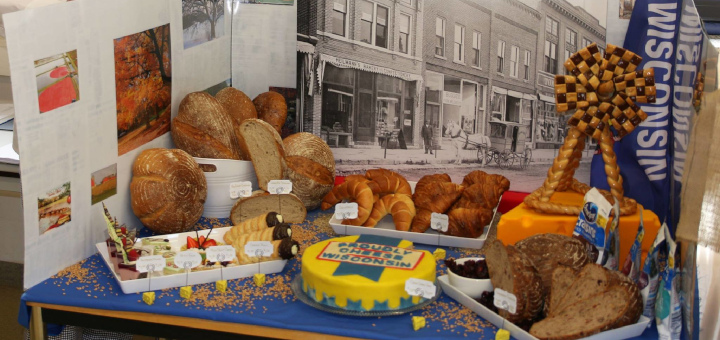
It was an overcast day in early January as I arrived in Dresden. I had convinced the guy, who had always asked me to sing Christmas carols at his Advent celebrations, to move me to the dorms where I would be spending the next six months attempting to become a master baker.
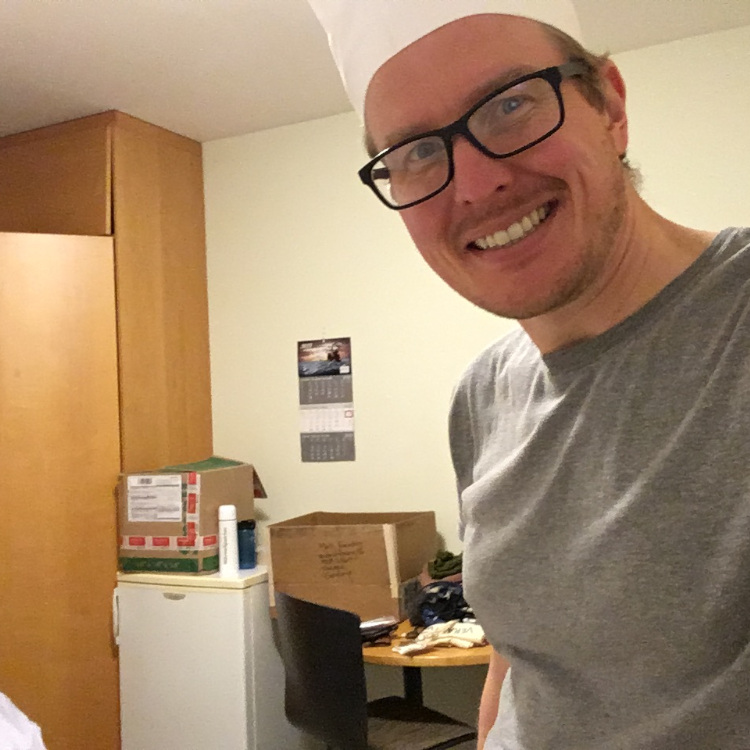
Although I had emailed the dormitory staff a couple weeks early to better understand what was available in the rooms and what I was expected to bring, I had heard nothing back. So, I packed as if I were moving back into college dorms: clothes, dishes, utensils, cookware, and a dorm fridge (which is actually a normal-sized fridge in Germany). I had also emailed them that I would be arriving a bit earlier; check-in time was 7 PM, and I was traveling with an older gentlemen who had to drive four hours back home. We arrived at 2 PM to locked gates.
The guard on duty reluctantly opened the gates and let us unload into the custodian’s closet. He laughed at what I had brought; apparently, it was too much. Everything, outside of clothing, was available from in the office. I thanked my driver and he took off home. I was asked to return after 7 PM. It began to sprinkle. Welcome to Dresden.
The first days of baker school consisted of many speeches and introductions. Each new representative reiterated the difficulty that lies ahead. As one would imagine, the first three such speeches will emphasize with seriousness of the experience; each iteration thereafter pushes one to hopelessness. By the end of the week, I was seriously asking myself what I got myself into. I later found out that I was not alone in my thinking.
Each of the teaching staff had an introduction, but then we also had visitors from the trades chamber, the examination committee, and the guild. Not only did many of them speak with a strong Sachsen accent, but some also with a further provincial dialect. At this point, I was understanding about 50 percent of what was being said. As I had been in Germany long enough at this point, I knew to expect it was doom and gloom and hardship: I got the gist of it.
Each part of the initial education was not at all what I had expected. In preparation for the theory portions, I had found some books on bread science and studied up on the characteristics of gluten and what role sulfur ions have in creating bonds between the layers of gluten. We come nowhere near that level. Our first weeks were discussing that there exists atoms and molecules and how heat transfer works. Instead of worrying about my scientific knowledge, I should have had spent my time with vocabulary! Oh, the confusion; woe, being overwhelmed. I purchased a dictionary as my phone did not always have a strong enough signal.
However, having a dictionary was not enough. I had to make notes of how the locals’ pronunciation differed from “Hochdeutsch”. ‘au’ is pronounced as a long ‘o’; ‘ei’ is pronounced as a long ‘a’. So, not only was I hearing a new word, but I also had to then re-hear it in standard German and then find the translation in the dictionary. After which, I would then document it in a separate notebook which I would study on weekends. [The Dumbledore of the academy like to review my notebook during class; I believe he was challenging his own knowledge.]
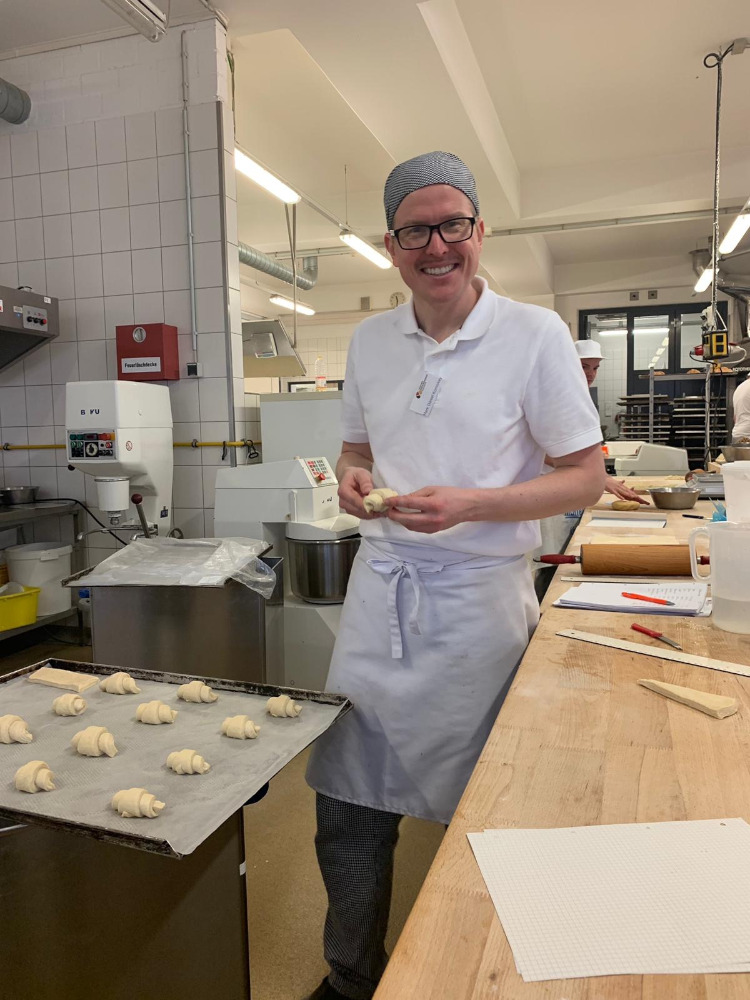
The twenty other students were generally quite younger than I – most of them younger than 26. Many of them had not traveled far from their homes before (some not even to Berlin), and I appeared to be their first foreigner. The initial questions were endearing, but I was glad to see that fade away after the first couple weeks. It was a good crowd with straight-forward goals in life: work, marriage, kids, and retirement – don’t rock the boat and meet expectations. Not necessarily aligned with my Weltanschauung.
Each of my classmates had gone through the baker journeyman process and were well positioned to jump into the master process. It was clear from the first written quiz that I was well out of my league. There were questions about milk’s impact on dough formation that we had never discussed in class that each of them knew as if commonsense. I had to hunker down and become a journeyman and master simultaneously. These initial three months were going to be rough. The practical and theory exams were to take place the beginning of April – a mere three months time.
Of course the practical side of becoming a master baker was also a major part of the exam process. That means that we spend many hours in the bakeries on the first floor turning out a variety of products. These products went well beyond the bread and rolls that one would expect. We were also responsible for learning how to make a variety of sweet treats, dessert cakes, and formal cakes. All of this would be a part of the final, timed exam.
Given my placement in the alphabet, I was assigned to Group 1, which meant that I would be training with the ‘baker manning the ovens’. It was good news to be working with a friendly face; however, we learned that he had recently incurred an injury and would be out for the next two months. That excitement was short-lived. Regardless, Group 2’s master was equally friendly and knowledgeable, so little was lost.
The bad news, however, was the pastry master assigned to Group 1 was new to the academy. She had received her master baker and master pastry chef titles by studying there, but was now slotted to take over for the retiring pastry chef, who was in charge of Group 2. The pastry chef lady infuriated me.
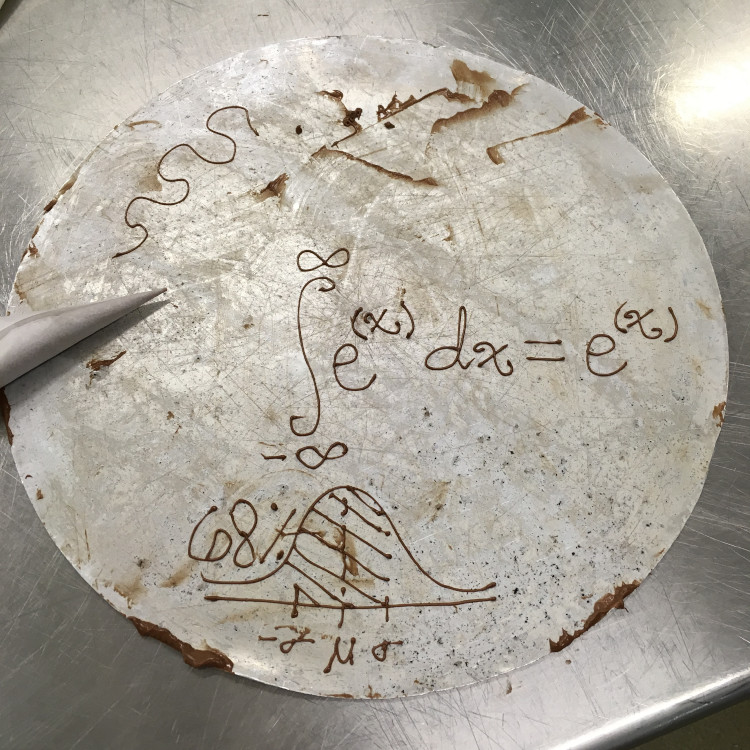
In our group of 12, we would all be creating the same product. I would find some of the tools I needed, but generally we would all have to share them amongst ourselves. Naturally, when someone asked if they could use something, I willingly bequeathed it. However, this meant that I was always the last to complete a task. And when we were to wrap up at 7:30 PM and I was finalizing my product into cleanup time, she was none to happy.
She would berate me for being too slow: “you do not have that much time in the exam.” Here I am thinking that this is training; I should take as much time as I need to learn how to make this product – often something I have never seen before. It got to a point where I asked to talk with her after the class. I laid out my concerns about not having all the tools I need in order to timely finish the product. She informed me that that was my problem: I will have similar challenges in the exam.
WTF? How can I be attending an academy where they do not have enough rolling pins for everyone during the exams? How is this possibly my fault? And why am I paying so much to be berated and condescended to?
Additionally, each time that she told me that my product was terrible, I asked for feedback: how can I make this better? Each time her answer was “practice.” Tell me: how can I practice something when I cannot do it right? Should I continue to practice something inaccurately? One can probably guess my solution: YouTube. I paid for instruction and I learned from YouTube. Disappointment.

I dreaded each day that I had to be in the pastry class. That room made me sick to my stomach. In Week 7, we had two back-to-back full days in the pastry workshop. After the first day, I went back to the dorm and seriously, seriously considered dropping out of the academy. And the stupid thing was that it was not because it was too hard (although, it was quite challenging), and it was not because it was too stressful (it was often overwhelming), it was because of the way I was being treated. I felt like I was paying a hefty tuition to be shat upon.
I am happy to say that I survived Week 7, but Week 11 came. The baker manning the ovens returned from his sick leave and took over our class in the bakery. He had new ideas. He pointed out that some of the specialty breads of my classmates were not special enough. Knowing that we had to turn in our recipe portfolios in a week, this enraged the students. [Note that my bread was super special and received one of the best grades in the practical exam.] But then he turned his attention to me.
I was forming some dough into loaves as I had done only a dozen times before. He walked by and announced that it was clear to him that I had never formed loaves before in my life. He then individually asked each student how long it took them before they had mastered forming loaves. Nine months, two years, three years… He then returned his disappointed gaze to me and explained that it is impossible that I would be able to learn how to form loaves in such a short time span. The entire class’s attention was now directed toward me and my ineptitude. I felt two inches tall (with a hat).
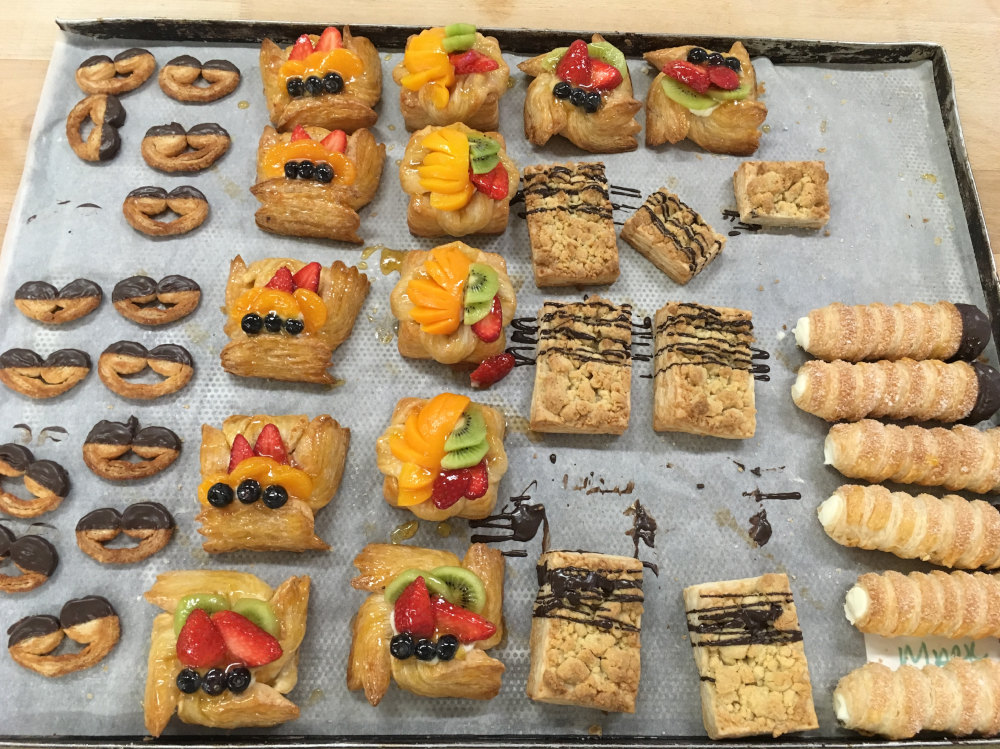
It was two weeks before our practical exam. My baking instructor had just told me (and the entire class) that I will never be able to correctly form a loaf. The practical exam is for bakers, which sort of implies an aptitude in bread baking. I have never had the wind so knocked out of my sails. Hopelessness was not even a strong enough word. I had had to sit down after that. After cleaning the bakery, I changed clothes, went back to my dorm room, and I wept. Thirty-six years old and I cried like a child.
Given my placement in the alphabet, I was assigned to the third and final examination group. This was Week 13 for those keeping track. The practical exam was strictly timed, and products were to be handed in at certain points. We had a total of 48 hours (inclusive of two 8 hour breaks for sleep) to produce 24 different products. We were to build these products from base flour, salt, water, and yeast; fondant and chocolate were the only products pre-prepared.
The exam started and ended in the afternoon. The two afternoons were used as prep time for the following days. Sourdough, cake sponges, and display pieces were prepared on our first afternoon. And immediately, things were not going well for me.
For our specialty cake, we each had to prepare one cake sponge, but baking only one sponge in the oven was inefficient, so we baked them with our partner. Well, my partner removed our sponges from the oven the turned around too quickly with the tray. Centrifugal force took my cake and transferred it on the ground in many mangled pieces.
The baking teacher from Group 2 witnessed this and suggested that we simply tell the examination committee about the mishap, but I did not want an asterisk next to my exam, so I diligently started making another sponge. Do not forget that this exam was timed! This means that I was running around trying to get my sauces cooked and my bread recipes weighed out for the next day’s use.
My partner who ruined my sponge offered to use some of his time to weigh out some of my breads. I accepted. However, I found out the next day that he used his recipes’ values, which were not the same as mine. In the throws of the stress of the next day, I ended up redoing his efforts. [We did also discover that he forget salt in what he weighed out for me.]
Each of the other students had already had exams similar to this. In fact, during the journeyman education there is a practical exam after 20 months as well as a final exam after three years. They were also stressed, but knew what to expect. To say that I was unprepared would be a gross understatement. I aged many years in those 48 hours. My petite fours, my bread rolls, and my croissants were disappointing; I could have done much better. My special bread and my wheat-mixed bread were phenomenal! I gave 100 percent. Had that initial prep day gone as planned, I would have enjoyed that experience much more than I had.
The examiners were friendly and open and supportive. Being German, they were blunt in their feedback. I got to know two of the examiners fairly well during those two days. I convinced one to sing for me since he was in a choir; thank you, Mr. Weissbach. The other always chose me during product feedback and gave me pointers on other ways I could take my products to the next level. I was exhausted but still interested getting these product tips.
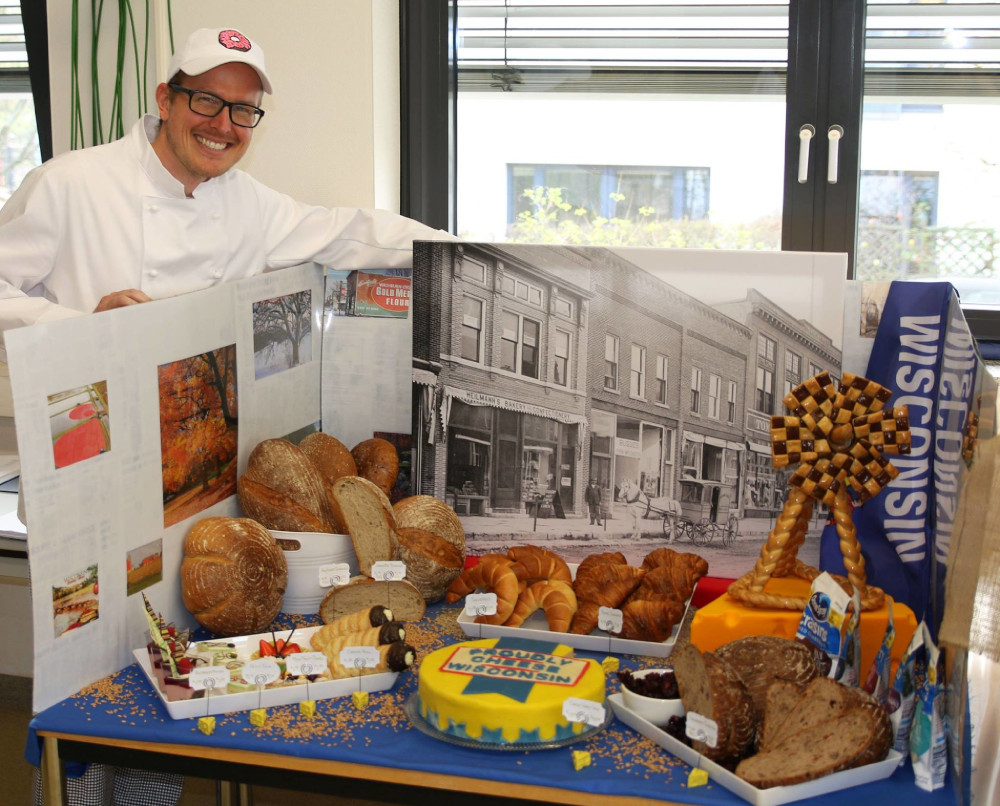
My baker snack, Chicago-style Deep Dish Pizza, was not well received, and I did not get many points for it. Also, they didn’t like my poppy seed cake, even though it was exactly how I had wanted it. Some of my other troubled products were rated high even though the pastry lady always said they sucked. In the end, I received a solid ‘C’, a grade right in the middle of the class. Two people got a ‘B’ and one (my partner) got a ‘D’. Not too shabby for someone who cannot form a loaf.
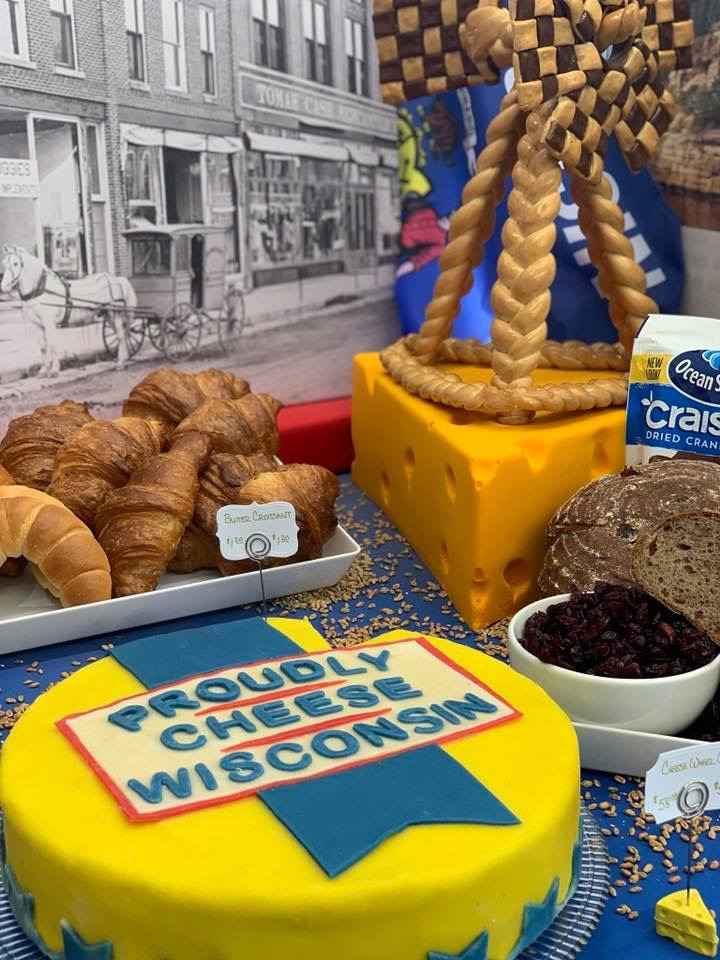
Important side note: the examiners obviously cut open the loaves as a part of the grading process. My examiner also pointed out that I had some forming errors. I subsequently approached my baking instructor and set up a time for him to theoretically walk me through the loaf forming process so I may better understand what I was missing.
We received our grades in a somewhat formal ceremony. Of the seven guys in that exam group, I had the second best overall grade. I was then asked to give a toast in front of the examination committee, the other students, the academy staff, and the trades chamber representatives. I explained that I was exhausted and would not be able to produce coherent German sentences. The Dumbledore of the academy said that an English speech would also be welcome. In my fatigued state, I gave a very nice toast to goals and journeys… which not one single person there understood.
The next Friday was the second series of exams: the theory examinations. I had reread the text book and memorized the facts from the lectures. I was prepared with the knowledge as well as a dictionary, which I was allowed to use for the written portions. I got an ‘A’ and the second best grade in the class. Not too shabby.

